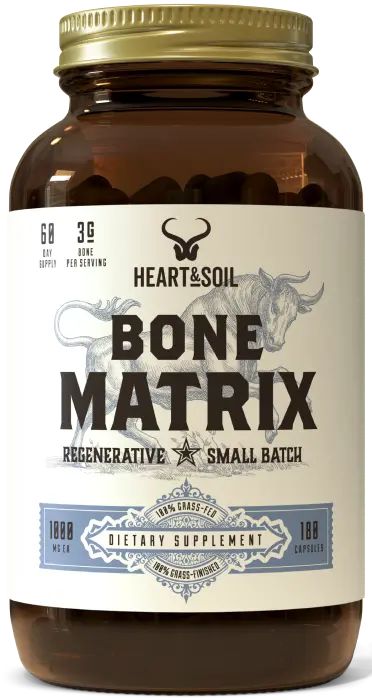PLEASE NOTE: The information in this blog is for educational purposes only. It is not a substitute for professional medical advice. Consult your healthcare provider if you’re seeking medical advice, diagnoses, or treatment.
On this edition of ‘foods your ancestors were smart enough to include’, we’re going to highlight the benefits of bone broth.
Unlike today, traditional cultures used as much of the animal as possible and practiced a “nose-to-tail” diet. One of the consistencies across the globe was the use of broth and stocks made with bones, hooves, meat, and other items that are usually discarded nowadays.
As you’ll learn, these foods that most people throw in the trash are packed with valuable nutrients that can dramatically improve your health.
Let’s take a closer look at the many benefits of bone broth!
What is Bone Broth?
Bone broth is simply boiled animal bones (typically from cattle, chicken, turkey, or fish), connective tissue, meat, vegetables, and herbs. When boiled, these inputs release a plethora of nutrients.

The resulting broth can be consumed as a warm beverage, used to make rice, or as a base for sauces, stews, and soups. It is incredibly nutritious, and bone broth is a great way to limit food waste and save money.
The benefits of bone broth have been recognized for centuries, from traditional Chinese medicine to Hippocrates in ancient Greece. Today, many take part in a bone broth fast to improve gut health, but there are many more benefits of bone broth.
The Many Benefits of Bone Broth
Why is bone broth good for you? While bone broth benefits still haven’t been studied extensively, it’s known to have a wide variety of positives.
For starters, bone broth is regularly suggested for gut and psychology syndrome (GAPS) patients with ADHD or autism (1). A study on mice even showed that bone broth was anti-inflammatory and reduced the symptoms associated with ulcerative colitis (2).

Another study found that chicken bone broth may be beneficial for reducing the risk of experiencing migraines (3).
Bone broth has also been used for centuries to help overcome ailments like the flu (4, 5). Chicken broth, mainly, is popular for illness recovery due to its digestibility and protein content (6, 7).
One of the major health benefits of bone broth is the presence of amino acids such as glycine, glutamine, and histidine (8, 9, 10).
Glycine is potentially the most celebrated amino acid in bone broth. Glycine can improve sleep, neurological function, and liver function and acts as a neurotransmitter for the central nervous system (11). It’s also a building block for glutathione (a key antioxidant) and collagen (12).
Speaking of which, you’ll also find collagen in bone broth (13)! While most studies have looked at collagen supplementation, this protein is connected to reduced joint pain, strengthened tendons, and many other health benefits (14).
Last but not least, bone broth provides calcium, magnesium, potassium, sodium, and other important minerals found in animal bones (15).
Stronger Joints from the Inside Out
Flexibility. Mobility. Strength.
Simple Bone Broth Recipes
You can find various store-bought bone broth brands like Bonafide Provisions, Fond,or Kettle & Fire that use organic chicken, turkey, or beef. If you’re the type of person who enjoys more control over your ingredients, then homemade bone broth is the way to go.
With store-bought brands, verifying the quality of the water, bones, or spices used can be difficult. If desired, you can cook the broth for longer to extract additional minerals like magnesium and calcium (16).
Here’s a simple beef bone broth recipe you can make in the comfort of your home:

If you struggle with histamine intolerance but still want the benefits of bone broth, consider trying a low-histamine bone broth instead. Follow similar steps above, but use a pressure cooker and set the timer for 2 hours. Once the time is up, strain the broth and freeze it immediately.

There’s no one correct answer regarding how much bone broth you should consume. It depends on the individual, as many like to drink it with each meal, while you can also use it as a warm beverage in the morning or before bed.
Are There Issues with Bone Broth?
One potential issue with bone broth is exposure to heavy metals. Due to the widespread presence of heavy metals in the environment, animal bones can store trace amounts of heavy metals such as lead (17).
The presence of these metals hasn’t been studied extensively, but a 2017 study concluded that the risks associated with bone broth consumption are minimal (18).
Chris Kresser crafted an informative article explaining how the nutrients in bone broth may offer protection against exposure to lead. He also emphasizes that while many nutrient-dense foods can contain a small amount of toxins, they can still be beneficial additions to your diet.
If you regularly consume bone broth, it may be helpful to occasionally run lab work with a medical professional and source bones from a local farmer to better understand how the animals were raised.
The Growing Popularity of Bone Broth…
A vital aspect of the animal-based diet is the adage of eating nose to tail. Doing so not only helps to limit waste it also helps fill in gaps that may be missing from a diet rich in muscle meat.
Past cultures understood the importance of drinking bone broth, and science is beginning to confirm this knowledge.
As we learned, bone broth health benefits are wide-ranging, from helping joint health, improving sleep, overcoming illnesses, and offering essential amino acids and minerals.
A simple addition to your diet, like consuming bone broth, can go a long way!
Bone Matrix
Become Unbreakable
Subscribe to future articles like this:

